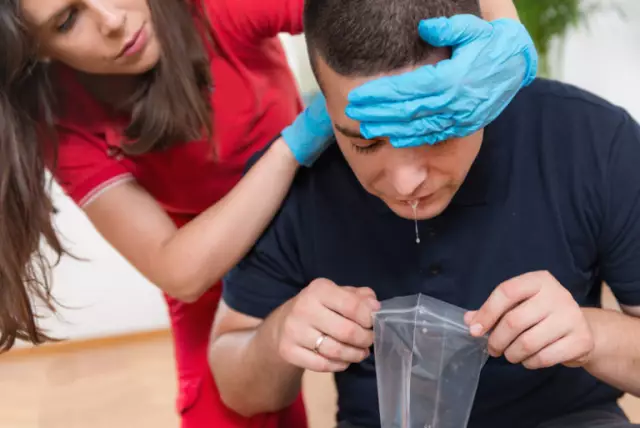- Author Rachel Wainwright [email protected].
- Public 2023-12-15 07:39.
- Last modified 2025-11-02 20:14.
Benzene poisoning
Benzene is a hydrocarbon compound of the aliphatic series, it is a colorless liquid with a characteristic odor.

Source: depositphotos.com
Benzene is widely used in many industries:
- rubber;
- pharmaceutical;
- chemical;
- printing;
- paint and varnish.
The maximum permissible concentration of benzene in the air is 0.1 mg / l.
How does the poisoning happen
Acute poisoning occurs, as a rule, as a result of technological accidents (breakdown of ventilation, rupture of the pipeline). Chronic benzene poisoning is observed in people who have been in contact with this poison for a long time.
Benzene enters the human body through the respiratory tract, causing damage to the nervous and reticuloendothelial systems of the red bone marrow. In acute poisoning, signs of damage to the central nervous system come to the fore. With prolonged intoxication, characteristic changes in the blood are added to them.
Benzene poisoning also leads to disruption of the metabolic processes of B vitamins, which has a carcinogenic, mutagenic and teratogenic effect.
Poisoning symptoms
For acute poisoning is characterized by:
- sore throat, cough, sneezing;
- dizziness and headache;
- noise in ears;
- nausea and vomiting;
- weakness;
- decrease in body temperature;
- tachypnea;
- bradycardia
- violation of coordination of movements;
- convulsions;
- euphoric state, which is gradually replaced by lethargy and coma.
If at the initial stage medical assistance is not provided, lesions of internal organs occur, as evidenced by:
- anemia;
- jaundice;
- ulceration of the skin and mucous membranes;
- hematuria (blood in the urine).
Chronic benzene poisoning develops in people who have been in contact with a toxic substance in a low concentration for a long time. It is characterized by:
- increased fatigue;
- decreased performance;
- headaches;
- tachycardia;
- muscle tremor;
- violation of coordination of movements;
- leg pain;
- paresthesia;
- hypertension;
- dysfunction of the liver, up to the formation of cirrhosis;
- gastritis with high acidity;
- anemia;
- bone pain;
- violations of potency in men and menstrual function in women;
- infertility.
The carcinogenic effect of benzene is manifested in the formation of atypical cells in the red bone marrow, which leads to leukemia.

Source: depositphotos.com
First aid for benzene poisoning
It is necessary to interrupt the contact of the victim with the poisonous substance as soon as possible, evacuating him to fresh air. If this is not possible, then it is necessary to open all windows and doors, increasing the natural ventilation of the room.
If benzene gets on the skin, they should be rinsed abundantly with running water or 1% sodium bicarbonate solution (1 tsp. Baking soda per ½ liter of water).
In severe benzene poisoning, cardiac arrest and respiratory failure can occur. In this case, it is necessary to immediately begin to carry out resuscitation measures, which at the prehospital stage include chest compressions and artificial ventilation of the lungs by mouth-to-mouth method. These measures should be continued either until the victim's cardiac activity and breathing are restored, or until an ambulance doctor arrives.
When is medical attention needed?
All cases of benzene poisoning are a reason for urgent medical attention.
Therapy of acute benzene poisoning is aimed at relieving metabolic and respiratory disorders, fighting seizures and other manifestations of intoxication.
In case of chronic poisoning, treatment begins with the normalization of the function of hematopoiesis. In case of severe disorders, blood transfusion is performed. Vitamin preparations are used to stimulate blood formation. Therapy is carried out aimed at improving blood supply and metabolic processes in the tissues of the brain and heart.
To reduce the risk of developing malignant neoplasms against the background of chronic benzene poisoning, antioxidant drugs (Ascorbic acid, Carnitine, Mexidol) are used.
Possible consequences
Acute poisoning in severe form often occurs with lightning speed and ends in death. After suffering intoxications of moderate and mild severity, the victims may develop:
- anemia;
- asthenovegetative syndrome;
- pneumonia;
- cystitis.
The consequences of chronic benzene intoxication are much more dangerous. These include:
- leukemia;
- bone marrow diseases;
- myelodysplastic syndrome;
- aplastic anemia;
- infertility.
Prevention
When working with benzene, you should carefully adhere to the safety requirements. All employees of enterprises who are in contact with benzene must undergo regular medical examinations by a therapist, neuropathologist, and, if indicated, by other specialists (gynecologist, hepatologist, hematologist, nephrologist).
A blood test is required at every medical examination.
It is forbidden to hire persons suffering from possible contact with benzene:
- epilepsy;
- organic diseases of the central nervous system;
- severe neurological disorders;
- any types of anemia with a hemoglobin content below 60 g / l;
- liver diseases with severe violations of its function;
- any types of hemorrhagic diathesis;
- kidney disease.
In case of light poisoning with benzene, after the treatment, the injured employee is temporarily transferred to another area of work, where the likelihood of contact with a toxic substance is excluded. If after two months during the medical examination no pathologies are detected, he can return to his previous work.
In case of more severe benzene intoxication, after the treatment, patients are sent for a medical labor examination to determine the degree of disability, disability group and the appointment of a pension.
YouTube video related to the article:

Elena Minkina Doctor anesthesiologist-resuscitator About the author
Education: graduated from the Tashkent State Medical Institute, specializing in general medicine in 1991. Repeatedly passed refresher courses.
Work experience: anesthesiologist-resuscitator of the city maternity complex, resuscitator of the hemodialysis department.
The information is generalized and provided for informational purposes only. At the first sign of illness, see your doctor. Self-medication is hazardous to health!






